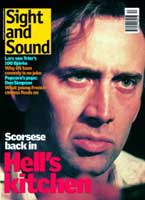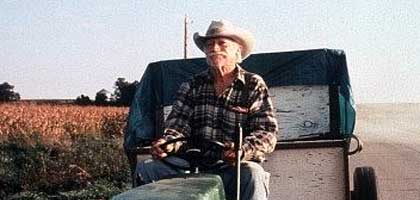
The Straight Story
USA/France/UK 1999

Reviewed by Kevin Jackson
Synopsis
Our synopses give away the plot in full, including surprise twists.
Laurens, Iowa, 1994. Alvin Straight, a stubborn 73-year-old widower who lives with his adult daughter Rose, suffers a bad fall and is sent to the local clinic. The doctor warns him he is in dangerously poor health and needs to take better care of himself, but Alvin shows little sign of mending his ways. Rose takes a phone call and learns Alvin's estranged older brother Lyle has had a stroke. Despite Rose's warnings and the incredulity of his fellow townspeople, Alvin is determined to travel to Lyle's home in Mt. Zion, Wisconsin, and try to patch up their ancient quarrel - by an idiosyncratic means of transport: a motor-driven lawnmower.
On his slow and often interrupted chug to Wisconsin, Alvin meets and befriends a variety of people, including coach tourists heading for a grotto; a pregnant teenage runaway; a woman whose daily commute to work usually involves crashing into and killing deer; volunteer firefighters; a generous family who allow him to live in their garden while his lawnmower is being repaired by identical-twin mechanics who constantly bicker with each other; a World War II veteran with whom Alvin shares anguished memories of combat; and a hospitable priest. At long last, Alvin reaches the ramshackle wooden house where Lyle lives. The two old men sit together on the porch, largely wordless though seemingly deeply moved by their long-deferred reunion.
Review
All the usual elements are present and correct at the start: the mock-innocent lilt of an Angelo Badalamenti score; a threateningly bland vista of one-storey clapboard houses and trimmed gardens; the mildly grotesque figure of a plump, recumbent woman sunning herself with a reflector while gobbling unappetising foodstuffs; a chillingly slow, predatory camera move in towards the house on the left; a sudden thumping noise from deep within. Any minute now, you expect David Lynch to bring on the severed genitals, the dwarves who talk Atlantean, the psychopath who injects himself in the pineal gland while crooning hits from Broadway shows of the 20s. Something like that, anyway.
Well, forget it. Behind the eerily normal and wholesome facade of Laurens, Iowa, are eerily normal and wholesome folks living ordinary lives. If you sit through The Straight Story waiting for Lynch to cut the cornpone and turn weird and ugly, then you will pass 111 minutes in vain, for the film is pretty much as good as its punning title promises. Its narrative has digressions, but not a single kink.
To be sure, there are a few sequences showing Lynch in a more familiar vein, such as Alvin's encounter with a woman who has inadvertently become a serial 'bambicide' ("Every week I plough into at least one deer and I love deer!"), or his dispute with the identical-twin mechanics who spend more time sniping at each other than tinkering with engines. And the film sometimes sounds as well as looks like a typical Lynch product: when Alvin and another old-timer sit at a quiet bar recalling the guilty horror of their war service, the air gradually becomes filled with the crash and wail of heavy artillery. On the whole, though, this is a film made by David Lynch the sometime Eagle Scout from Missoula, Montana, not David Lynch the inspired sicko behind Blue Velvet and Eraserhead.
Grant this disconcerting limitation, and there's a lot to admire about the film, from Freddie Francis' cinematography (it's hard to do much new with sweeping fields of Iowan corn, but Francis manages it: some of the aerial shots render these growths as burnished tweed) to the impeccable and moving tact of the final reunion between the two brothers. Harry Dean Stanton's appearance as Lyle is as haunting as it is brief, though the film's richest performance belongs to Sissy Spacek as Alvin's "simple" daughter Rose who, with her speech impediment and habit of building bird-houses, initially seems like a refugee from the Lynch carnival but gains in gravity with every scene. The Straight Story also has the best crane-shot joke in years: the camera catches Alvin's puttering progress from behind, rises into the sky with epic majesty, then gracefully sweeps down again to reveal Alvin, about four feet further down the highway.
But to enumerate redeeming features is to confess a need for redemption. Lynch's film risks being nothing more than sweet-natured, and its habit of treating ornery old Alvin like a kindly wizard who sets people's lives to rights with a twinkle and a yarn can be more than a trifle sickly. In its least beguiling moment, Alvin tells a sad runaway a little homily about binding sticks together into a bunch so they won't break. "That's family," he sums up; at which point, ill-natured viewers will snarl that the Romans used to call such wooden bundles fasces and look where that homely symbol ended up.
Credits
- Producers
- Mary Sweeney
- Neal Edelstein
- Screenplay
- John Roach
- Mary Sweeney
- Director of Photography
- Freddie Francis
- Editor
- Mary Sweeney
- Production Designer
- Jack Fisk
- Music/Music Conductor/Orchestrator
- Angelo Badalamenti
- ©The Straight Story, Inc.
- Production Companies
- Alain Sarde presents with Le Studio Canal+ and with the participation of Film Four a Picture Factory production
- Executive Producers
- Pierre Edelman
- Michael Polaire
- Production Co-ordinator
- Anne Johns
- Unit Production Manager
- Billy Higgins
- Location Manager
- Bob Medcraft
- Post-production Supervisor
- Spike Allison Hooper
- Assistant Directors
- Scott Cameron
- Simone Farber
- Eric Sherman
- Script Supervisor
- Jules M. Stewart
- Casting
- Jane Alderman
- Lynn Blumenthal
- Associates:
- Catherine Head
- Sarah Jane Hill
- Nancy Briggs
- Aerial Directors of Photography
- David Nowell
- David Butler
- Camera Operator
- Gordon Hayman
- Special Effects
- Gary D'Amico
- Set Decorator
- Barbara Haberecht
- Costume Designer
- Patricia Norris
- Costume Supervisor
- William T. Zacha
- Make-up
- Bob Harper
- Hair
- Sally Harper
- Deborah Dee
- Special Make-up Effects
- Crist Ballas
- Titles/Opticals
- Pacific Title/Mirage
- Music Editor
- Walter Spencer
- Score Engineer/Mixer
- John Neff
- Soundtrack
- "The Most Requested Song (from Strange Tales of the Late West)" by Middlejohn, John Neff; "Y' Ready" by Spade Cooley, performed by The Radio Ranch Straight Shooters; "Solo Spin Out" by/performed by The Radio Ranch Straight Shooters; "Happy Times" by Sidney Fine, performed by Jo Stafford
Sound Design- David Lynch
- Location Sound Mixer
- Susumu Tokunow
- 2nd Engineer
- Bryan Arenas
- Re-recording Mixers
- John Neff
- Additional:
- Patrick Giraudi
- Supervising Sound Editor
- Ron Eng
- Dialogue Editor
- Walter Spencer
- Effects Editors
- Ron Eng
- Doug Jackson
- Foley
- Supervisor:
- Howard Neiman
- Artists:
- Diane Marshall
- David Fein
- Recordists:
- Lucy Sustar
- Mary Erstad
- Editor:
- Howard Neiman
- Stunt Co-ordinators
- Rick LeFevour
- Jim Fierro
- Helicopter Pilot
- Bobby 'Z' Zajonc
- Cast
- Richard Farnsworth
- Alvin Straight
- Sissy Spacek
- Rose Straight
- Harry Dean Stanton
- Lyle Straight
- Everett McGill
- Tom the John Deere dealer
- John Farley
- Thorvald Olsen
- Kevin Farley
- Harald Olsen
- Jane Galloway Heitz
- Dorothy
- Joseph A. Carpenter
- Bud
- Donald Wiegert
- Sig
- Tracey Maloney
- nurse
- Dan Flannery
- Doctor Gibbons
- Jennifer Edwards-Hughes
- Brenda
- Ed Grennan
- Pete
- Jack Walsh
- Apple
- Max the Wonder Dog
- farm dog
- Gil Pearson
- bus driver
- Barbara June Patterson
- woman on bus
- Anastasia Webb
- Crystal
- Max Guidry
- Steve
- Bill McCallum
- Rat
- Barbara Robertson
- deer woman
- James Cada
- Danny Riordan
- Sally Wingert
- Darla Riordan
- Barbara Kingsley
- Janet Johnson
- Jim Haun
- Johnny Johnson
- Wiley Harker
- Verlyn Heller
- Randy Wiedenhoff
- Jerry E. Anderson
- firemen
- John Lordan
- priest
Garrett Sweeney- Peter Sweeney
- Tommy Fahey
- Matt Fahey
- Dan Fahey
- boys in truck
- Russ Reed
- Mt Zion bartender
- Ralph Feldhacker
- farmer on tractor
Certificate- U
- Distributor
- Film Four Distributors
- 10,029 feet
- 111 minutes 26 seconds
- Dolby digital
- Colour by
- FotoKem
- Anamorphic [Panavision]
